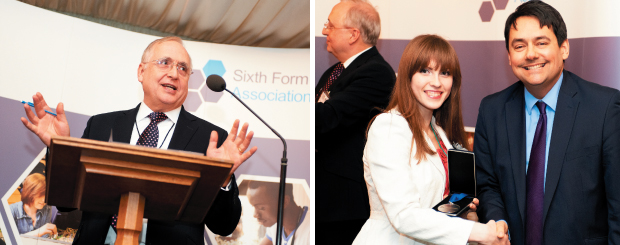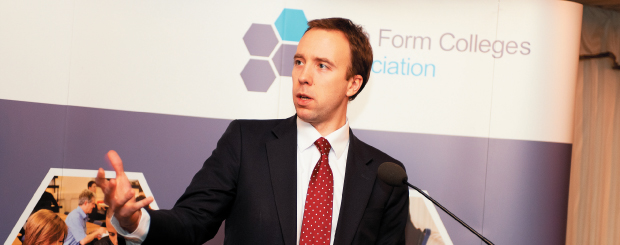Colleges often feel undervalued and under threat. The Sixth Form Colleges Association, launched last week, is determined to change that
More than 150 guests were at Westminster for the official unveiling of the rebranded Sixth Form Colleges Association and heard how sector principals were competing in an unfair education market.
The event, on Tuesday, came just hours after the association, which previously called itself a forum, produced a White Paper for ministers, arguing “students should receive the same amount of funding for their education, irrespective of the type of institution they choose to study at”.
An association spokesperson said: “Data from the Department for Education shows the median funding per learner in academies with key stage 4 is £7,880, while the median funding per learner in sixth form colleges is £4,601.
“Furthermore, sixth form colleges have to pay VAT on goods and services, while schools and academies are reimbursed for these costs — an anachronism which costs sixth form colleges an estimated £30m per year.
“Forthcoming changes to the way that 16-18 education and training is funded will further disadvantage sixth form colleges.”
Association chair David Igoe told Westminster guests: “We [sixth form colleges] are noted for the excellent quality and 76 per cent of our colleges are judged by Ofsted to be outstanding or good.
“We educate more than 150,000 young people aged 16 to 18, we supply one-in-seven of all entrants to British universities and we are true engines of social mobility with more students of disadvantaged backgrounds and low retainment that can be found in either schools or academy sixth forms — so we do a great job.
“But, despite this, we do feel undervalued and under threat. We accept there is a market for sixth form education, but it’s not a level playing field. We are in the market at a disadvantage.
“We play uphill against the opposition. We are very concerned about our future and the White Paper highlights this.
“We want the government to build on the success of the sixth form colleges model, which provides a template for efficient and effective delivery for 16 to 18 education.
“We want to create a genuine mechanism for sixth form colleges to grow and promote the sector in the same way that academies and free schools are actively promoted by the government. We hope this will be a real springboard for a better deal for our colleges.
“We are now a strong association with a clear agenda, and we look to politicians from all parties and constituencies to support us to give us that level playing field where our quality and our success will be the only thing that counts.”
The event, with guests including Lady Sharp and MPs Sir Bob Russell and Nic Dakin, also marked the official launch of the all party parliamentary group for sixth form colleges.
I don’t think sixth form colleges are properly appreciated by ministers”
Group chair Kelvin Hopkins MP, who has been a governor of Luton Sixth Form College for 20 years, said: “This is a very special reception because it comes so shortly after the formation of the all party group — and it genuinely is an ‘all party’ group.
“I happen to be a Labour member of Parliament myself, but we have vice chairs from four other parties and a secretary from the Conservative Party. All parties support it because we all know what a superb job sixth form colleges do.
“We felt it necessary to raise the flag for sixth form colleges, to lobby ministers and to ensure they are aware of the great value and tremendous success of sixth form colleges.”
He added: “My view is that the government would do well to form many more sixth form colleges if it wants to make sure youngsters get the best possible education between the ages of 16 and 19, and that they have the most efficient form of education in that age group, too.
“My second House of Commons speech, many years ago, was in praise of sixth form colleges. I asked ministers to do more to support them and to sustain them and to treat them fairly in relation to other educational institutions.
“I said in my speech they were geese that lay golden eggs. Another metaphor was that they were jewels in our educational crown, and I genuinely believe that — they are the best educational institutions we have.
From left: Sixth Form Colleges Association chief executive David Igoe and Student award winner Edvarda Salinaite, 20, with Shadow Education Minister Stephen Twigg
“Every other institution has some kind of drawback, but sixth form colleges actually work and do a superb job. I don’t think sixth form colleges are properly appreciated by ministers.They need to be told and it’s our job to tell them just that.”
FE Minister Matthew Hancock was at the launch and paid tribute to the performance of sixth form colleges.
“Sixth form colleges have for decades now been doing the job and playing the role that is central to the government’s vision for the future of education, which is autonomous and strong organisations with local leadership embedded in the community,” he said.
“There is one sector that has excellent results … through strong local leadership of organisations that are responsive and autonomous that has delivered high standards, and that’s the sixth form college sector and I support you hugely in what you do.”
Shadow Education Secretary Stephen Twigg, who gave out awards to sixth form college students for efforts to promote international understanding, also spoke at the event.
“I’ve had the opportunity over the last year or so to visit several sixth form colleges around the country and to see the brilliant work that is going on. We’ve had a number of meetings and I look forward to meeting the all party group now that it’s been set up,” he said.
“The principle of the level playing field is a sound one and I look forward to engaging with the association and with the all party group over these next few months in terms of the detail in the White Paper, which I very much welcome.”
Arthi Nachiappan, 18 and from Nottingham’s Bilborough College, claimed the association’s gold medal. She speaks English and Tamil and is studying Spanish and French. She also goes to Polish language sessions every week and is a member of the Sierra Leone Project.
She said: “It really is an honour to be here at the launch of the SFCA. It’s important for me to highlight that there are many other students in my college who could equally have been nominated for his award.
“I hope politicians across the political spectrum will continue to support this dynamic and effective form of post-16 education so that students in the future can have similar opportunities to improve their own international understanding.”
The silver award went to Edvarda Salinaite, 20 and from Grimsby’s Franklin College, while bronze was picked up by Kyle Turakhia, 17 and from Leicester’s Wyggeston and Queen Elizabeth I College and Sheikh Shahnawaz, 18 and from Birmingham’s Joseph Chamberlain College.
FE Minister Matthew Hancock
Caption for featured image at top of article: Student award winner Arthi Nachiappan, 18, addresses audience members at the launch event



Your thoughts